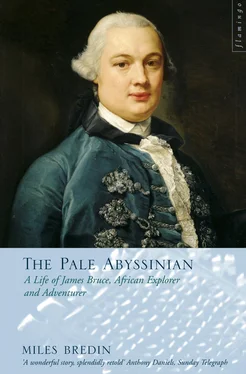1 ...7 8 9 11 12 13 ...19 I am sorry that you are so badly off for your carnal callings [replied the victualler] but comfort yourself in your thoughts to make it up with interest when you return to Christendom. But if you should tarry longer in that cursed country then you ought to write to your friends to send you a pretty housekeeper.
To Bruce, this seemed a magnificent idea and soon came news of just such a housekeeper wending her way towards Algiers. Amazingly she had the same name as his former mother-in-law – Bridget Allen – but judging by the ‘fondest wishes’ that are sent to her by Bruce’s many correspondents with whom she stayed on her way to Algiers, she was somewhat more winsome. Her presence was brief. She died in childbirth (we can only guess who had fathered the child), in November 1765, and Bruce was once more left on his own.
He devoted the time to preparation. Dr Richard Ball, the consulate’s surgeon, spent many hours teaching his ever-curious superior the rudiments of medicine so that he would be able to look after himself in the interior. Bruce also decided that he was going to need someone to help him record the things he saw. Accordingly he wrote to Andrew Lumisden and Robert Strange – the latter having just been made an academician in Bologna – asking them to find a suitable young artist who could accompany Bruce on his travels. A search began throughout Italy for someone willing to drop everything to go travelling with an irascible Scot in unexplored country. Unsurprisingly, it took a long time. Meanwhile, Bruce was encountering problems in Algiers. He had intended to put the consulate in ‘the hands of a vice-consul, who is very able, and much esteemed’, but Forbes never had the opportunity, for Bruce was never given permission to travel whilst still consul, a source of great irritation to him since that was his sole purpose in accepting the £600 a year position in the first place. The only real difficulty in his first year would be his relations with his predecessor.
Simon Peter Cruise had been acting consul in the years between the departure of the previous office holder and Bruce’s arrival. Most of the community had united behind Cruise in his opposition to Bruce and he spent his days persuading friends to lobby for Bruce’s removal in London and spreading rumours about him in Algiers. Bruce received little support for he refused to indulge in the corruption that had enriched Cruise and the other merchants. This was a society where everyday corruption oiled the wheels of business: Bruce’s moral stance thus had a stagnatory effect on trade and met with a hostile reception from almost everyone. He took on Cruise over what most would have regarded as a trifle: a debt owed to the widow of a merchant captain which had gone missing during Cruise’s period of office. Cruise tried to fend off Bruce’s ever more virulent letters on the subject.
I said, and now repeat it to you, that if you do not furnish me with an account, or if you furnish a false one, the consequences will fall upon yourself or, as it is oftener called, upon your head. The consequences of false accounts, Mr Cruise, are not capital, but whatever they are, do not brave them. Remember what your behaviour has been to His Majesty’s consul, and to every British subject here in Algiers. In consideration of your family, I give you warning not to begin shuffling with me.
In one of Cruise’s many replies, he revealed that Bruce had challenged him to a duel: ‘I receiv’d your letter which you may believe surprised me much, as it contains nothing less than a challenge to fight you at your or my garden.’
Worse was to come. The previously peaceful posting was about to dissolve into anarchy.
As has been mentioned, Algiers was ruled by a Dey – on behalf of the Turks – and under him was a divan (a type of cabinet of advisers). In previous centuries, the Dey had been an all-powerful figure – obeyed on pain of death and utterly ruthless in his dealings – but as the strength of the city state began to ebb away, so too did the power of the office. By Bruce’s time the Dey was as good as subject to the wishes of the divan and the divan, whilst still high-handed, was at least conscious of the wishes of the people. At this time, the people – already victims of famine – were growing increasingly angry with the British. Britain conducted a great deal of trade in Algiers and the Mediterranean but by virtue of the treaty of 1682 they paid very little for the privilege. British ships were issued with passports (known as passavants) that were recognized by the Algerian corsairs. Any ship that could not produce a passport was legitimate bounty for the pirates. The French and Spanish, however, had found a way around this and thus the people of Algiers, who survived primarily on piracy, were earning less and less every year.
In 1756, the French had briefly captured Mahon, then a significant British port. Admiral John Byng was executed for failing to hold it, thus inspiring Voltaire’s joke in Candide: ‘il est bon de tuer de temps en temps un amiral pour encourager les autres’. The French captors discovered some passavants in the commander’s office, copied them and gave them to their own and their allies’ ships. Spanish and French sailors had been sailing unmolested under British passavants ever since. Each time a French or Spanish ship was stopped by pirates or boarded in port they would produce their British passavants and the Algerians would grudgingly have to let them through. It was soon noticed, though, that none of them spoke English.
One such ship was brought to Algiers under tow and Bruce told the Algerian corsairs that indeed they were right, this was not an English ship, thereby condemning the entire crew to slavery. This he described as a ‘disagreeable necessity’ but it was not disagreeable enough to stop him from repeating it twice. His actions drew the attention of the Algerian mob – already irritated by the little revenue they were earning from the British – and conflict loomed. Not comprehending the depth of the enmity between France and Britain, the Algerians suspected that the British were giving passports to anyone. At the same time the British Admiralty decided to act. Their solution was to change the design of the passavants and issue British ships with new and different ones. It had not occurred to the sea lords that the old ones were recognized by sight rather than by being read by the illiterate corsairs. With the famine crazed mob baying for blood and the divan divided as to what should be done, Bruce swaggered upon the scene, behaving as though, should the Algerians not obey his wishes, the entire might of the British Navy would be brought down upon their unfortunate heads.
There were two schools of thought within the divan: the doves were led by Aga Mahomet, who liked Bruce and realized that challenging the British was not a very safe course of action even if he did suspect that the consul was all bluster and no bellows. The Dey himself, with the backing of the mob, was hawkish. The merchants in the European community at Algiers were also less than helpful, having been manipulated by the embezzler Cruise, and soon Bruce was mired in trouble. In May 1764, Bruce had asked leave to resign and been turned down: he could therefore not be dismissed. In June the Dey pricked Bruce’s pride and gave him the impetus to carry on. The Dey, Bruce was informed, had appointed a slave to act as British consul and had sent a pithy missive to Mr Pitt in which he insisted that Bruce be replaced: ‘Your consul in Algiers is an obstinate person and like a b—; and does not regard your affairs,’ it said.
Bruce dared not walk the streets, and the Foreign Office, preoccupied with rather more important matters, gave him no guidance. In July the situation became worse when the Dey announced that all British shipping would now be subject to pillage and the crews enslaved. Bruce managed to get messages to the other ports in the Mediterranean, warning British merchants not to approach Algiers, but it was too late for one ship. He wrote to Halifax, pleading for instruction:
Читать дальше











